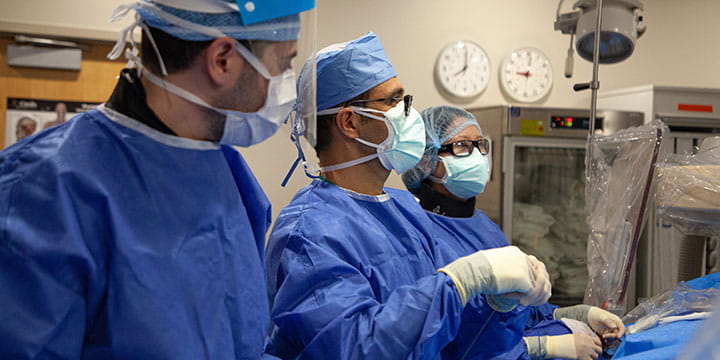Education & Training

First Year Interventional Cardiology Fellowship Training
Supervised by world-renowned faculty, fellows should expect excellent preparation in coronary intervention. The case mix includes complex coronary disease and access to leading-edge technologies in hemodynamic support, intravascular imaging, and cardiac devices.
During the first year, fellows alternate between UH Cleveland Medical Center, UH Ahuja Medical Center, UH Parma Medical Center, UH Portage Medical Center, UH Lake West Medical Center and the Louis Stokes Cleveland VA Medical Center catheterization labs. This exposure allows the fellow to work with a broad range of interventionalists in academic and community settings providing diverse clinical exposure. The procedural volume is excellent and includes approximately 4,000 cases per year across the UH system.
The first-year interventional fellow is responsible for supervising the pre-catheterization evaluation of all patients by our general cardiology fellows and for the performance and periprocedural management of all complex and interventional patients. First-year interventional fellows also spend one half-day per week in Interventional Cardiology Clinic seeing pre-and post-procedural patients.
First Year Interventional Procedural Training:
- Percutaneous coronary intervention (PCI)
- Bypass graft PCI
- Primary PCI
- Fractional flow reserve (FFR)
- Intravascular ultrasound (IVUS)
- Optical coherence tomography (OCT)
- Rotational and orbital atherectomy
- Laser atherectomy
- Mechanical and rheolytic thrombectomy
- Left ventricular assist devices
Second Year Interventional Cardiology Fellowship Training
Second-year interventional cardiology fellows in unaccredited advanced fellowships declare a training interest in one of three advanced interventional areas – high-risk coronary (CHIP), peripheral /endovascular, and structural intervention. This training experience enables fellows to acquire expertise in an area of advanced intervention while still retaining a broad-based training exposure. The second-year interventional fellows spend one half-day per week in Valve Clinic and Vascular Clinic seeing pre-and post-procedural patients during those respective rotations.
High-Risk Coronary (CHIP) Training
- Coronary chronic total occlusion (CTO) revascularization – antegrade wire escalation, antegrade dissection reentry, and retrograde techniques (Hybrid Algorithm)
- Coronary bifurcation techniques
- Coronary atherectomy – Laser, rotational, orbital, and rheolytic.
- Stent optimization techniques including intracoronary imaging
- Left ventricular assist device placement and Protected PCI
- Percutaneous revascularization of multivessel CAD, left main disease, bifurcation lesions, and prohibitive surgical risk patients
- Revascularization of patients with left ventricular dysfunction and poor hemodynamics
- Revascularization in patients with difficult vascular access
- Use of coronary microcatheters and guide extensions
- Use of bailout techniques: intracoronary coils, thrombin, covered stents
Peripheral/Endovascular Training:
- Lower extremity arterial endovascular and hybrid revascularization
- Complex endovascular lower extremity reconstruction including retrograde pedal, tibial, popliteal, and radial access
- Medical, diagnostic, and complex endovascular treatment of Critical Limb Ischemia (CLI) patients
- Deep venous arterialization procedures
- Atherectomy
- Carotid, vertebral, and subclavian intervention
- Renal and mesenteric intervention
- Fibromuscular dysplasia (FMD) treatment with OCT, FFR, and IVUS
- Catheter-directed thrombolysis
- Mechanical and rheolytic thrombectomy (upper and lower extremity)
- Mechanical thrombectomy for pulmonary embolism (PERT)
- Venous intervention including treatment for acute and chronic deep venous thrombosis
- Balloon pulmonary angioplasty for CTEPH
- IVC filter placement and retrieval
- Peripheral IVUS, OCT, and FFR
- Renal denervation
- Endovascular treatment of erectile dysfunction
- Exposure to vascular medicine
Structural Training:
- ASD/PFO closure
- VSD closure
- Left atrial appendage occlusion
- Mitral valvuloplasty
- Mitraclip and transcatheter mitral valve replacement
- Tricuspid valve intervention
- Transcatheter aortic valve replacement (TAVR)
- Valve-in-valve procedures
- Intracardiac echo (ICE)
- Transseptal puncture
- Patent ductus arteriosus (PDA) closure
- Pulmonic valvuloplasty
- Transcatheter Pulmonary Valve Replacement
- Pulmonary Vein Intervention
- Aortic Coarctation Stent
- CardioMems implantation
Conferences
Interventional Cardiology Fellows at University Hospitals receive high-quality lectures with direct faculty instruction through various weekly and monthly conferences, including:
- Friday Core Curriculum Conference Series
- Cath Conferences led by interventional fellows every Tuesday.
- UH Harrington Heart & Vascular Institute's Cardiovascular Grand Rounds on Thursdays. This series features world-renowned speakers on various cardiovascular medicine topics.
- A monthly multidisciplinary Shock/Morbidity and Mortality Conference attended by both interventional faculty and cardiothoracic surgery faculty.
- Quarterly Journal Club presentations from high impact publications


